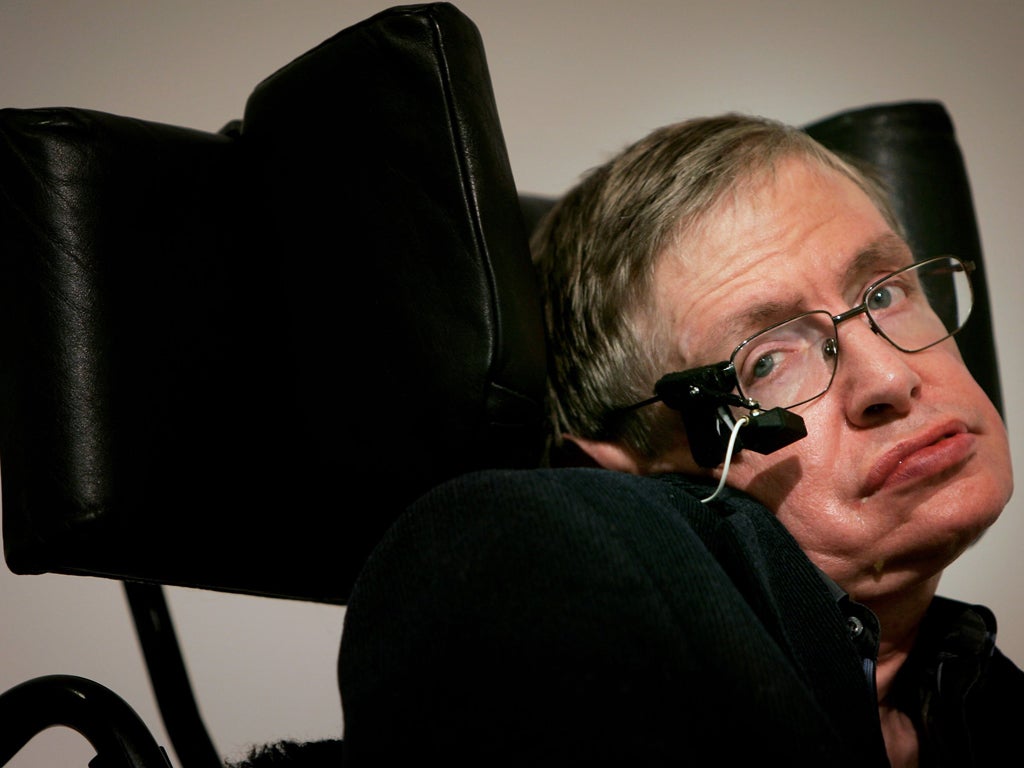Stephen Hawking wins £1.8m physics prize

Your support helps us to tell the story
From reproductive rights to climate change to Big Tech, The Independent is on the ground when the story is developing. Whether it's investigating the financials of Elon Musk's pro-Trump PAC or producing our latest documentary, 'The A Word', which shines a light on the American women fighting for reproductive rights, we know how important it is to parse out the facts from the messaging.
At such a critical moment in US history, we need reporters on the ground. Your donation allows us to keep sending journalists to speak to both sides of the story.
The Independent is trusted by Americans across the entire political spectrum. And unlike many other quality news outlets, we choose not to lock Americans out of our reporting and analysis with paywalls. We believe quality journalism should be available to everyone, paid for by those who can afford it.
Your support makes all the difference.Professor Stephen Hawking has been named as one of the first recipients of the most lucrative science prize in the history of time.
The £1.8 million Special Fundamental Physics Prize was established earlier this year by a Russian billionaire.
Britain's most famous theoretical physicist, who is used to grappling with large sums, says he plans to spend his windfall on his daughter's autistic son and "maybe" buying a holiday home.
Prof Hawking and a team of scientists who led the hunt for the Higgs boson mass particle received separate prizes worth three million US dollars (£1.8 million) each.
The former Lucasian professor of mathematics at Cambridge University, who is severely disabled with motor neurone disease, earned his prize for a lifetime of achievement unravelling the mysteries of quantum gravity and the early universe.
In particular, the award recognised his discovery of Hawking radiation, a quantum effect that allows black holes to "evaporate" by emitting particles.
The Special Fundamental Physics Prize is one of several awards set up by Yuri Milner, a Russian internet mogul who abandoned his PhD in physics to make a fortune from the web.
In an email sent to the Guardian newspaper last night, Prof Hawking - whose book "A Brief History of Time" became a best-seller - said he was "delighted and honoured".
He added: "No-one undertakes research in physics with the intention of winning a prize. It is the joy of discovering something no-one knew before.
"Nevertheless, prizes like these play an important role in giving public recognition for achievement in physics. They increase the stature of physics and interest in it."
On the thorny question of what to do with the money, Prof Hawking added: "I will help my daughter with her autistic son, and maybe buy a holiday home, not that I take many holidays because I enjoy my work in theoretical physics."
Prof Hawking turned 70 in January but was unable to attend public celebrations of his birthday because of illness.
British scientists were among the team of seven attached to Cern, the European Organisation for Nuclear Research based in Geneva, who shared the second Special Fundamental Physics Prize.
All were involved in the design, construction and operation of the Large Hadron Collider (LHC), the vast particle accelerator used to track down the Higgs boson.
In July, scientists at the LHC believed they caught a glimpse of the particle that had eluded physicists for nearly five decades.
Nicknamed the "god particle", the Higgs is theoretically responsible for mass, one of the most vital properties binding together the universe.
The British LHC prize winners include Professor Tejinder (Jim) Virdee, from Imperial College London, and Dr Lyn Evans from Cern.
Prof Virdee, who worked on CMS - one of the giant LHC detectors where subatomic particles are smashed together - said: "The prize not only celebrates fundamental science but also recognises the audacious undertaking of the many scientists, engineers and technicians from around the world who, over many years, came together to build a powerful detector, one that will still have the potential to produce remarkable physics for years to come."
Dr Evans, who was project leader of the LHC during its construction, said: "It's fantastic news. We have been acknowledged as the team that led the design, construction and commissioning of the LHC project.
"In the LHC collider, the accelerator, and the Atlas (another detector) and CMS experiments are so inter-related that it has required close co-operation throughout the whole 16 years of construction. During that time, we have faced many challenges that we have overcome together.
"The tremendous performance of Atlas, CMS and the LHC is witness to the skill and dedication of our many collaborators, which we are very proud to represent."
Professor John Womersley, chief executive of the Science and Technology Facilities Council (STFC), which funds the scientists, said: "The United Kingdom has been one of the leading partners in the construction both of the LHC and the instruments and detectors linked to it.
"The UK is a world leader in particle physics and has played a central role in the research coming out of Cern, from the theorists who formulated the model known as the Higgs mechanism, to the engineers and scientists who have designed, built and exploited the LHC.
"We're really pleased that this award has recognised some of these UK scientists and engineers whose major contributions to the project have helped answer some of the most complex questions being asked about the formation of the universe."
The other scientists sharing the prize were Dr Peter Jenni and Dr Fabiola Gianotti, both from Cern, Professor Guido Tonelli, from the University of Pisa, Professor Joe Incandela, from the University of California at Santa Barbara, and French physicist Dr Michel Della Negra, who is based at Imperial College London.
PA
Join our commenting forum
Join thought-provoking conversations, follow other Independent readers and see their replies
Comments